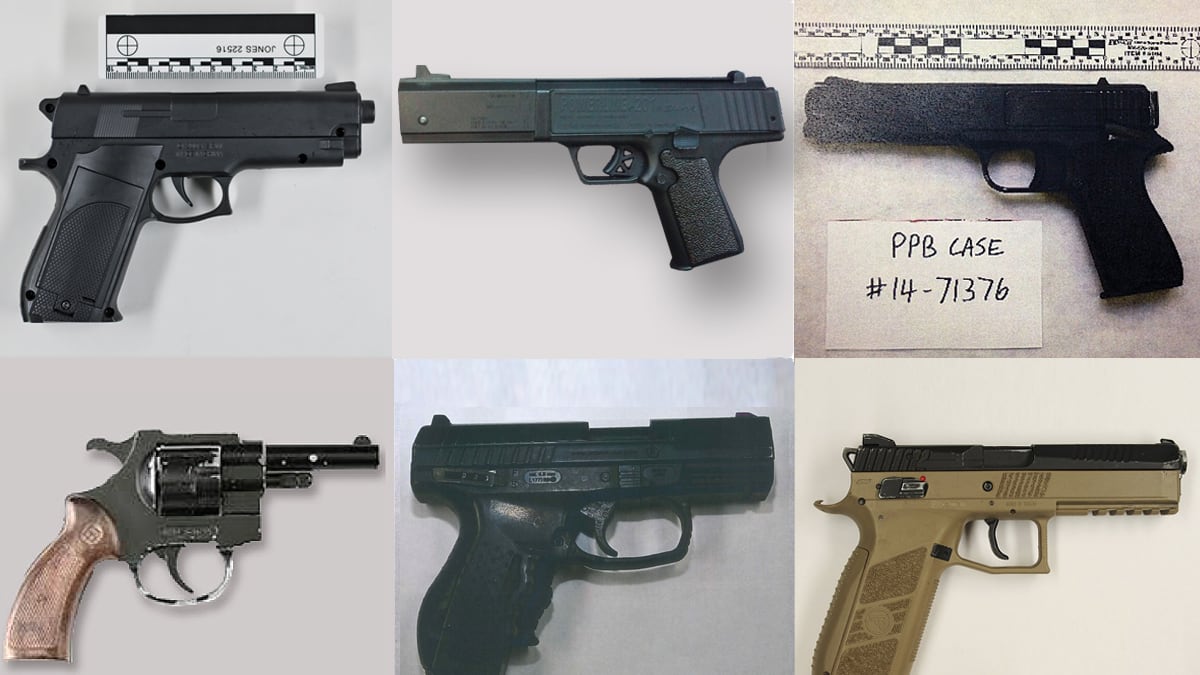Portland police Officer Dominic Lovato was standing in a WinCo parking lot on a summer night when he suddenly found himself looking down the barrel of a gun.
Lovato and his partner had been chatting with three people outside the grocery store at Northeast 122nd Avenue and San Rafael Street a few minutes before midnight on June 28, 2015. Lovato started to search the vehicle after seeing drug paraphernalia—and one of the three people, 29-year-old Alan Lee Bellew of Eugene, reached into the car and aimed a gun at him.
"As soon as I saw the revolver and it was pointed at me I thought, I am going to get shot," Lovato later told a grand jury. "I might die."
Lovato yelled, "Gun!" Then he and his partner, Officer Michael Currier, shot Bellew eight times. He was pronounced dead at the scene.
Bellew died after he pointed a gun at Lovato that could not have hurt the officer. It fired only blanks.
When a technician at the Oregon State Police crime lab tested Bellew's gun, he determined it was a starter's pistol, the kind used at track meets.
The circumstances of Bellew's death are disturbingly common in police shootings.
Overall, officer-involved shootings are rare in Portland—there have been an average of four per year since 2009. In the past eight years, records show, Portland police officers have shot 30 people. Of that total, seven shootings involved fake guns. Four of the shootings were fatal.
Two of those shootings occurred earlier this month, on Feb. 9. Both shootings allegedly involved replica weapons.
One of these shootings left 17-year-old Quanice Hayes dead. Officer Andrew Hearst shot Hayes while investigating a robbery. Police say Hayes was carrying a replica handgun. Later, in Southeast Portland, police shot Donald Alan Perkins, 56, after he pointed a gun at them. Perkins survived, but officers said the gun he carried was also a replica.

If those accounts are correct, it lands Portland in the center of a problem with national scope.
In December, the Washington Post published an investigation into police shootings involving replica guns. The paper found that police killed 43 people in the U.S. in 2015 in incidents involving fake weapons, and the same number again in 2016. That's 4.4 percent of all fatal U.S. police shootings during those two years.
Yet unlike other cities where teenagers holding toy guns have been killed by police—including Baltimore, New York and Chicago—Portland hasn't banned the sale of replica weapons.
Penny Okamoto, executive director of the gun control nonprofit Ceasefire Oregon, says her group would like to see a statewide ban on the sale of replica guns.
"Guns are not toys," Okamoto says. "Toy guns are like candy cigarettes—they should have gone away a long time ago."
Mayor Ted Wheeler's office says it has no immediate plans to seek a ban.
Wheeler's spokesman, Michael Cox, says such a ban faces a variety of obstacles, such as recreational use by hobbyists and paintball players and the legal challenge of passing local ordinances that conflict with state laws.
"If it could be done and if it could help, then it's obviously something we'd be interested in taking a deeper look at," Cox says. "It's something we're looking at as part of the overall environment around policing. Oregon has a legally complicated landscape around gun regulation."
Replica guns are easy to obtain. At Dick's Sporting Goods in the North Portland neighborhood of Hayden Meadows, a full aisle is dedicated to pellet pistols and air rifles. A Smith & Wesson "range ready" air pistol sells for $69.99.
Other cities have taken action to reduce the availability of fake guns. Most recently, the Baltimore City Council voted in December to ban the sale of fake guns after a detective shot a 14-year-old boy holding a BB pistol.
Gun rights groups, including the National Rifle Association, have opposed such bans across the country, saying they are ineffective and criminalize innocent behavior.
Kevin Starrett, executive director of the Oregon Firearms Federation, the state's leading gun rights group, didn't respond to a request for comment.
Although the Oregon Legislature has been a battleground for a wide variety of gun control measures, nobody in the Capitol has tried to ban replica weapons. A spokeswoman for Everytown for Gun Safety, the most active gun control group here and nationally, says it has no position on replica gun bans here.
JoAnn Hardesty, president of the Portland branch of the NAACP, has decried the killing of Quanice Hayes, who was black. But Hardesty says she's not sure a ban on replica gun sales would be effective, because people who want to use guns—real or fake—to commit crimes aren't worried about breaking the law. "I'm not sure if a law like that would have much of an impact," she says.

Officials say it will be mid-March before a grand jury hears the details of Hayes' death or the other Feb. 9 shooting. So it's unclear what witnesses will add to the police narrative of confronting realistic-looking guns.
Back in 2015, when Lovato and Currier told a grand jury about the starter pistol Bellew pointed at Lovato, they had plenty of backup from the testimony of Bellew's friends.
"It looked to me as real as a gun could look," Bellew's friend Wesley Howe testified July 2, 2015. "No cap on the end to signify a cap gun. It looked very real."
WW staff writer Rachel Monahan contributed reporting to this story.

